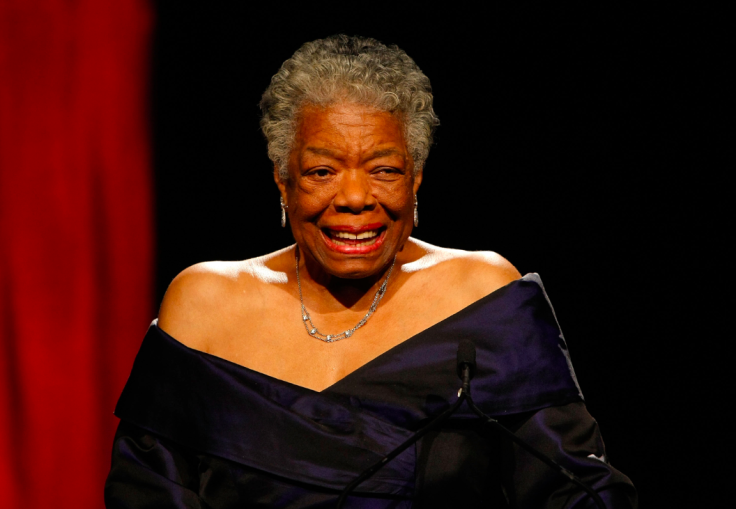Maya Angelou Birthday Quotes: 10 Witty, Inspiring, Poetic Insights From The Writer

Poet, author and civil rights activist Maya Angelou was born April 4, 1928. A giant in American literature, Angelou broke gender and race barriers to write about her childhood in the Jim Crow South. Her writing was as devastating as it was astute, and she no doubt inspired many people who felt powerless to find power within themselves.
Angelou passed away in 2014, when she was 86 years old. Although she became physically frail in her last years, her mind was as sharp as ever; “ I'm fine as wine in the summertime,” she told a Guardian reporter in 2009.
Read: Michelle Obama, Bill Clinton Herald Maya Angelou As Force In History
On what would have been her 89th birthday, here are some of Angelou’s most insightful quotes.
Angelou on human beings and storytelling from a 2013 interview with the Harvard Business Review:
“Human beings should understand how other humans feel no matter where they are, no matter what their language or culture is, no matter their age, and no matter the age in which they live. If you develop the art of seeing us as more alike than we are unalike, then all stories are understandable.”
Angelou’s insights on writing and truth, from an interview with the Paris Review in fall 1990:
“I really love language. I love it for what it does for us, how it allows us to explain the pain and the glory, the nuances and the delicacies of our existence. And then it allows us to laugh, allows us to show wit. Real wit is shown in language. We need language.”
“Most people don’t grow up. It’s too damn difficult. What happens is most people get older. That’s the truth of it. They honor their credit cards, they find parking spaces, they marry, they have the nerve to have children, but they don’t grow up. Not really. They get older. But to grow up costs the earth, the earth. It means you take responsibility for the time you take up, for the space you occupy. It’s serious business. And you find out what it costs us to love and to lose, to dare and to fail. And maybe even more, to succeed. What it costs, in truth. Not superficial costs—anybody can have that—I mean in truth. That’s what I write. What it really is like. I’m just telling a very simple story.”
“I look at some of the great novelists, and I think the reason they are great is that they’re telling the truth. The fact is they’re using made-up names, made-up people, made-up places, and made-up times, but they’re telling the truth about the human being—what we are capable of, what makes us lose, laugh, weep, fall down, and gnash our teeth and wring our hands and kill each other and love each other.”
Angelou on modesty and women’s success, from a 2008 interview:
“You see, I have no patience with modesty. Modesty is a learned adaptation. It’s stuck on like decals. As soon as life slams a modest person against the wall, that modesty will fall off faster than a G-string will fall off a stripper… Whenever I’m around some who is modest, I think, ‘run like hell and all of fire. You don’t want modesty, you want humility. Humility comes from inside out. It says someone was here before me and I’m here because I’ve been paid for. I have something to do and I will do that because I’m paying for someone else who has yet to come.”
“So we mustn't run out of steam. Sometimes young women think ‘Dammnnn, I’ve been doing this nine years and I don’t think anything has budged.' But keep plugging away. Nothing succeeds like success. Get a little success and then just get a little more.”
“If we are smart, we go to church or synagogue or mosque. If we are very smart we are still studying something. We are such knockouts. We are phenomenal.”
And of course, Angelou’s own writing. Here’s a line from “I Know Why The Caged Bird Sings,” published in 1969:
“There is no greater agony than bearing an untold story inside you.”
“Instead, pursue the things you love doing, and then do them so well that people can't take their eyes off you.”
And this one from “Phenomenal Woman,” published in 1978:
“Pretty women wonder where my secret lies.
I'm not cute or built to suit a fashion model's size
But when I start to tell them,
They think I'm telling lies.
I say,
It's in the reach of my arms
The span of my hips,
The stride of my step,
The curl of my lips.
I'm a woman
Phenomenally.
Phenomenal woman,
That's me.”

© Copyright IBTimes 2025. All rights reserved.






















